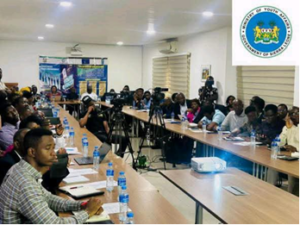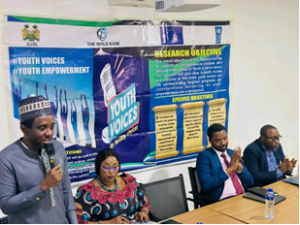In a strong reaffirmation of its dedication to youth empowerment, the Ministry of Youth Affairs (MOYA) and its partners on Tuesday, 20th May 2025, concluded a one-day high-level “Status of Youth” Steering Committee Meeting at the Hub Hotel Conference Hall in Wilberforce, Freetown. The event brought together senior Government officials, civil society representatives, international development partners and youth-led organizations; all united by a common goal: to revitalize the national dialogue on youth development.


The newly appointed Minister of Youth Affairs, Ibrahim Sannoh, in his address made a compelling introduction, laying out an ambitious Strategic Vision for 2025-2028. With a focus on agriculture, climate resilience, skills development and digital innovation, the plan aims to position Sierra Leone’s young people as “innovators, entrepreneurs and leaders” driving inclusive growth and national transformation.
“This is not just about programs it’s about possibilities,” declared the Minister. “We are rewriting the future and our young people will hold the pen.”
The Minister outlined four major thematic areas that will guide the Ministry’s strategic focus: Agribusiness and Food Security, Climate Change Adaptation and Resilience, Skills Development and Employment and the Digital Economy and Innovation. Within this comprehensive framework, he stated that the Ministry has set ambitious goals, including the creation of 35,000 youth jobs, the launch of over 300 youth-led agribusiness start-ups and the training of 20,000 young people in climate-smart agricultural practices.
He added that the strategy targets a 15% increase in food yields and aims to boost youth incomes by 30%, signaling a bold push towards youth empowerment and sustainable economic transformation.
“We are not here to decorate reports we are here to deliver,” Ibrahim Sannoh reminded the audience, earning nods of approval and resounding applause.
Projects like “Youth Cooperative Farms”, “Youth Agri-preneurship Funds” and “Value Addition Centers” were highlighted as vehicles to achieve those targets.
Adding data-driven weight to the proceedings, Andrew Lavaley, Executive Director of the Institute for Governance Reform, presented a “Draft Status of Youth Report”, revealing both the challenges and opportunities facing Sierra Leone’s youth.
Key findings include:
* Only 22% of youth are in paid employment, with men twice as likely to be employed as women.
* Agriculture remains the largest employer, accounting for 33% of youth employment.
* Food poverty affects 52% of young people.
* 63% rely on charity to meet basic needs.
* Vulnerable groups such as youth with disabilities, pregnant girls and young mothers face the greatest socio-economic risks.
Andrew Lavaley noted that while education increases employability, 39% of youth with university degrees are employed; youth without education remain largely marginalized. Alarmingly, 1 in 5 young people is unemployed, and longer unemployment spells are common among those aged 26–35.
Minister of Trade and Industry, Alpha Ibrahim Sesay, also made a key policy announcement, revealing that his Ministry will soon launch two major projects focused on boosting entrepreneurship and innovation in the informal sector. Targeting youth and small enterprises, these initiatives aim to enhance income generation and promote sustainability.
“The informal sector is the heartbeat of our economy,” said the Trade Minister. “By equipping young people with the tools to innovate, we’re turning that heartbeat into a rhythm of resilience.”
The meeting emphasized urgent policy recommendations:
* Implement cash transfer and livelihood support programs for vulnerable youth
* Develop family-friendly policies, including affordable childcare and reproductive health services
* Expand access to technical and vocational training through accredited short-term courses, especially for uncertified skilled youth.
Other speakers, including the Deputy Minister of Youth Affairs, UNDP representatives, NaCSA and CSO leaders, echoed support for these measures and encouraged sustained collaboration across sectors.
The Status of Youth Report will inform future Government strategies and development programs, ensuring that young men and women benefit from emerging economic opportunities. It will also guide the design of targeted interventions in employment, empowerment and education.
As the event closed with a vote of thanks from the Commissioner of the National Youth Commission (NAYCOM), the mood was far from ceremonial. The energy, ambition and clear-eyed focus that filled the room signaled the beginning of what many are calling a Youth Renaissance in Sierra Leone.
With over 60% of the population under the age of 35, the stakes for Sierra Leone’s future have never been higher. But if the resolve shown at Tuesday’s meeting is anything to go by, the Ministry of Youth Affairs is ready to lead from the front and the youth of Sierra Leone are more than ready to follow.